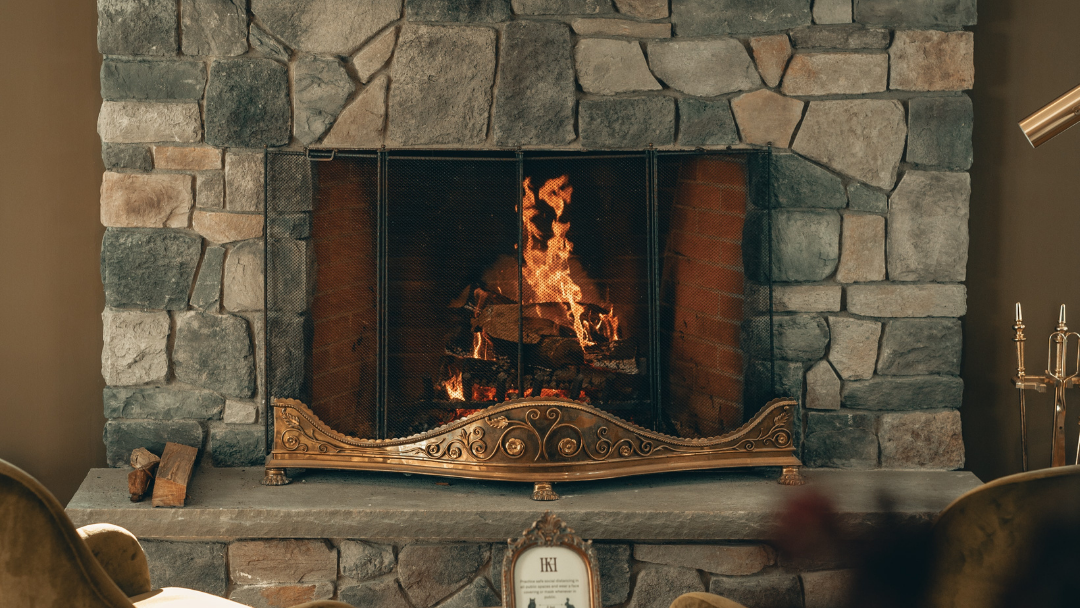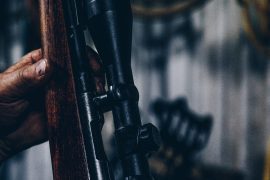THE CHAIR HAD EXISTED IN ITS HOME FOR ALMOST FORTY YEARS. It was as much a part of the house as the frail bones that made up the moldy structure of the walls or its flaccid companion who sat, drank, and wasted away upon its cushions. When it was brought home, the chair had been a bright amber that sat as a striking contrast to the cherry wood floor and the ivory-dusted wallpaper. However, after years of misuse and age, it had faded and withered away and now resembled a moldy pumpkin slowly sinking in on itself in front of a stagnant, puffing fire.
The chair had always been present in the home. It had been there when its old companion had moved out and the new one moved in, when there had been children to play hide-and-seek beneath its cushions, and when its new companion had come home every evening to find blessed comfort in its foam cushions at the end of a long day. The chair’s current companion looked back at those days with resentful melancholy; his life had turned into a present and constant state of burning misery. Presently, he was weathered and whiskey-soaked; when he had moved into the home, he had brought others with him—three young children and a beautiful young wife. Then one day, not so long ago, the man had come home alone, dressed in black, with a red, tear-stained face; he had sat down on the chair with that first bottle and had hardly moved since.
When the chair’s companion did move, it was usually to stoke the fire, which he left burning every day and every night. Whiskey glasses and broken bottles were scattered across the floor, intertwined with small, dark bloodstains left behind by unfeeling feet. Similar bloodstains now marked the chair’s reclining footrest. What was once the most treasured part of the chair had been ill-treated, malfunctioned, and stained with a mixture of blood, whiskey, and stolen families.
The fire was the only feature of the home that the chair’s companion continued to care for. It sat in the center of the room dressed in brick and iron; the fireplace rose up out of the floor and loomed over the home’s occupants. Currently, the fire was a dull, crackling flame that served to keep the chair’s companion warm, allowing him to continue existing in unending redundancy, while the slow, soft sounds of a stagnant, wasted life echoed through the stale air: swig . . . swallow . . . swig . . . swallow . . .
The chair’s companion had taken to staring at the wall. Recently, a smudge of ash had appeared on the wallpaper above the iron cage of the fireplace, capturing his obsessive interest. The man supposed the image was from the constant cloud of heat and smoke from the exhaling fire. The hollow form of a woman’s face stained the wall’s surface—a taunting figure drinking in the mourning-soaked air. The chin was long, sharp. The nose was small, pointed. As for the eyes, the chair’s companion spent long hours entranced by the two white ovals surrounded by smoky features. The face appeared to be in pain, locked in an endless scream of agony, with its jaw extended down to the roof of the fireplace.
For the first time that night, the chair’s companion got up from his place of endless rest and walked across that broken glass to the fireplace. He bent down and grabbed one of the rusted pokers to stoke the fire, which hissed at him before crackling awake. The man reached across and gently ran his fingers across the silhouette on the wall. He fingered the ivory wallpaper peeling away like dry, dying skin and tried to push it back into place—back onto the face staring steadily back at him.
Eventually, he gave up, turned away from the fire, grabbed a new bottle of whiskey from the bag on the table, and rejoined the chair in front of the fire.
The night continued on in its usual pattern: swig, swallow, swig, swallow, swig, swallow. It was a tradition that the man had begun to take comfort in; drink just enough to where those memories didn’t start knocking on his door trying to creep back in. Drink until he passed out, wake up, then start again.
Swig, swallow… swig, swallow…
Tonight, however, the longer he drank, the more focused he became on the wall. With every swig he took, the ash appeared darker, more defined. Faint dimples and sallow cheekbones had appeared on either side of her open mouth. As he stared at the image, his vision became blurry, and his head began to lightly throb while he struggled to keep his eyes from becoming crossed. He looked down at the whiskey bottle in his hands wondering if he had been drinking faster than he had intended.
He settled farther down into the chair and tried to ground himself in the reality of the fabric beneath him. He leaned his head back on the headrest and closed his eyes. Instead of meeting the calming dark, a shadowy feminine figure with glaring white eyes greeted him. She looked directly back at him through his closed eyelids and began to slowly open her jaw and let out a searing scream that he felt reverberate down into the interworking of the chair.
The man jerked forward and looked at the fireplace; the smudge on the wall appeared darker, and the shape of its nose had become more apparent with flaring nostrils inhaling the smoky air. He closed his eyes and opened them again unsure if what he was seeing was an alcohol induced hallucination. He had had them frequently since the passing of his family; visions of his wife and children bustling around the empty room and were there to greet him at the end of a long day. When he opened his eyes again, the image above the fire remained unchanged; the new detail seeming to become more vivid, more striking every time he closed and opened his eyes again.
The man sat back in his chair and focused his gaze on the ceiling. He tried to clear his head and forget the woman on the wall. His limbs had finally started to relax back into the cushions of the chair when he heard a slight clinking noise by the fireplace. The man moved his gaze towards the bottles on the floor and found they were rolling ever so slightly over the broken glass, pushing against one another.
The man watched the bottles rolling on the floor and looked down at the one still in his hand. He swirled the golden liquid and watched it slosh against the inside edges of the bottle. He decided the bottles on the floor weren’t really moving, the image on the wall wasn’t actually there, and that the only real presence in this room was the bottle in his hand and the oblivion it promised. So he settled back into the chair and tried to fall back into his only routine.
Swig, swig, swallow . . . swig, swig, swallow . . .
What started out as a soft, tinkling melody quickly became a more raucous clangor. The bottles scattered around the base of the fireplace began to move violently. Some were pushed to the left, some to the right, and some leapt up into the air, flying across the room smashing against the wall. The chair’s companion watched mesmerized as the bottles continued to move, hardly daring to breathe from his spot on the decomposing amber.
The fire began to steadily rise; the reflection in the shattered glass gave the illusion of flaming fingers rising from their iron cage and reaching for the chair’s edges. The man pulled at the collar of his shirt as sweat began to gather on his neck.
Swig, swallow, swig, swig, swallow . . . swig, swallow, swig, swig, swallow . . .
The man heard a soft crunching in front of the fireplace. The longer he listened, the closer the sound seemed to be to his spot on the chair. When he looked down, the man noticed the broken pieces of glass scattered in front of the fire cracking into several smaller shards. The cracked glass moved in time with the sound. He watched the fragments of glass that were closest to his spot on the chair break and then stop as a tense silence began to overwhelm him. He could no longer ignore the strange happenings in this room. He could only hope that the whiskey would soon take hold, so he could pass out and forget this strange night.
He took a deep breath and dared a glance at the face on the wall startled when he found nothing there. The wall was once again a blank, dusty surface covered in peeling, ivory paper.
Swig, swig, swig, swallow . . . swig, swig, swig, swallow . . .
He looked at the empty bottle in his hand and threw it at the iron fire. The glass shattered against the metal and fell to the ground in a heap of sparkling sand. The fire answered by roaring to life heating up the bars closest to the flames, which became a dangerous glowing orange.
The man tried to stand up and get away from the blistering heat, but he was forced back down by the spinning room. He felt heavy—languid. The man determined he needed to leave the room, so he braced himself to stand up again. Placing his hands on the chair’s arms, he began to force himself up to a standing position. He was about to straighten up to his full height when he felt two bony hands on his shoulders, forcing him back down into the heavy cushions’ sweltering pits. He sat frozen in fear; he could feel a suffocating presence hovering behind the chair.
The man continued staring at that empty, blank wall. His reason started to slip away; was now clean—it was perhaps the only part of the house that was clean—and that there was a heavy pressure in his chest, weighing him down.
He decided to focus on that pressure and use it to center himself and, hopefully, sober up enough to get out of the chair. He reached up to rub his shoulders and was met with cold flesh that was not his own. He froze, his hand still on top of the icy casing, and slowly dared a quick glance out of the corners of his eyes. He could see long gray hands settled on top of his shoulders paralyzing him. He watched as those bony claws dug into his skin, slow-moving joints extending and then digging in with one long press at a time, leaving behind slow trickling wet spots. He quickly looked down, down at the fading orange cushions, at the color that had represented his ceaseless mourning. He felt hot breath tickling the back of his neck and moving up to softly caress his right ear.
He sat frozen in fear as the presence around the chair seemed to smother the life that barely existed in the room. The man started taking longer, shallower breaths as his heart rate began to increase. He felt those claws drag down his left arm, tracing a path of sharp, agonizing pain. He dared a look over his shoulder and was met with long dark hair and lifeless white eyes, the same white eyes that had watched from the wall—his doom manifested as swirling white lights warning him of danger. He began extending his jaw to let out a terrified scream, but he choked on the sound. He couldn’t breathe and thinking became painful as electric pulse after electric pulse attacked his body.
A pair of cold, dead hands wrapped around his throat. He could feel each finger and every knuckle as one-by-one they pushed down against his adam’s apple, and he felt a few small rivets of blood run down his neck as sharp, black nails cut against his skin. Time began to slow and the world darked as he suffocated, writhed, and slowly lost consciousness.
~
The chair had kept watch, alone in that frail, moldy house for forty days. It took forty days for someone to come looking for the body that sat lifeless on those rusted cushions. No one had missed him; no one had thought to check on him. That dead body had become as much a part of the chair as the stained fabric and soft foam that filled its innards.
When people finally arrived to box up the chair’s companion, the phrase “heart attack” had been thrown around while broken glass bottles had been placed into small plastic bags. No one had paid any mind to the smudge on the wall above the fireplace. One of the men knocked over an unbroken bottle of whiskey that had been set on top of the coffee table; it rolled over onto its side with the label facing upward. There, on the label, were large bronze letters and the shadowy outline of a woman standing in front of a lighthouse: she had a sharp jaw, a delicate nose, and a steady, white light illuminated the landscape around her.
When the man was finally taken away with a white sheet laid over him, the chair was left behind. And there it sat—between the peeling walls; before the cold, dead iron cage; with only the stains on the walls to keep it company—waiting for a new companion.
Like what you’re reading?
Get new stories or poetry sent to your inbox. Drop your email below to start >>>
OR grab a print issue
Stories, poems and essays in a beautifully designed magazine you can hold in your hands.
GO TO ISSUESNEW book release
China Blue by Catherine Gammon. Order the book of which William Lychack Jeffries calls “a fiery declaration of all that is inexpressible about desire and loss and the need to find a home in a world in which even the most solid and real of things feel often less than completely solid or real.”
GET THE BOOK



